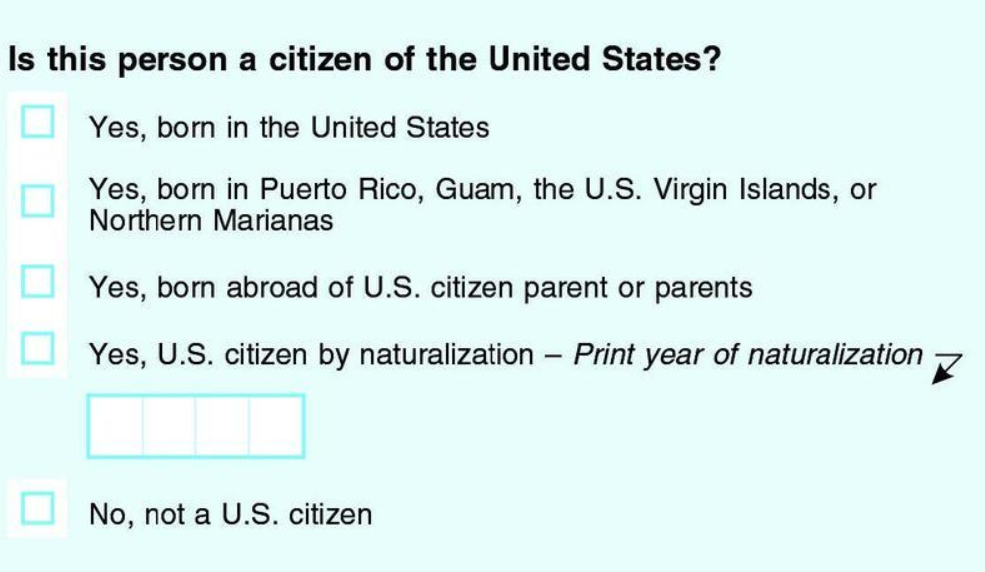The Supreme Court will decide whether including a question about citizenship in the 2020 census violates the Constitution’s enumeration clause (also referred to as the Census clause), which requires a head count of all persons in the US every ten years. The case generated debate about census participation and whether the information collected will be used responsibly. The Justice Department argues that gathering citizenship information will help the government better enforce the Voting Rights Act, a civil rights law which prohibits discrimination against any citizen’s voting rights. Others see a different motive – to either surface or intimidate the counting of noncitizens. Perhaps in another political climate, the inclusion of a citizenship question would be more palatable. But under the current administration, many are concerned that disclosing citizenship status will do harm.
If you’re wondering how the census works, here’s some background. The Constitution mandates an “actual enumeration” of each person in the US every 10 years. The Census Bureau hires hundreds of thousands of temporary workers who must build an accurate list of every housing unit in the US (there are more than 140 million), develop strategies to maximize responsiveness, and follow-up with those who don’t respond. The census is usually administered by mail with some in-person follow-up. The census not only decides Congressional seat allocation, but is also used in myriad budgetary and public policy decisions, the vast majority of which affect citizens and noncitizens as well as the communities in which they live. To ensure everyone is counted, participation is required by law.
It’s impossible to predict with certainty how a citizenship question would impact census participation.
Support for Including a Citizenship Question
In December 2017, then Attorney General, Jeff Sessions, issued a memo requesting the inclusion of a citizenship question in the 2020 census to ensure “robust and evenhanded enforcement of the Nation’s civil rights laws…,” namely, the Voting Rights Act. His argument involved a hypothetical scenario where a district with a numerical majority of racial minority residents is unable to elect their preferred representative to Congress because a large portion of that racial minority group might not be citizens, and therefore not eligible to vote. In other words, even in a district that is drawn to maximize a racial minority group’s representation, if the majority of individuals counted by the census – and therefore, considered during the redistricting process – are not actually citizens who can vote, then they’ll consistently be underrepresented at the polls. Without citizenship data, Sessions argued, the power of racial minority voters would be diluted. The Commerce Department, which is in charge of administering the census, echoed this reasoning and added that critics’ concern about scaring off census responders is outweighed by the value of more complete and accurate data.
Importantly, the citizenship question, if included, would only ask whether an individual is a citizen, not whether they are in the country legally – see image below.
As proponents will remind anyone who argues with them, a citizenship question was included in the census until 1950 and has been included in the American Community Survey (ACS) almost every year since. The ACS is currently our primary source of information about how many citizens live in the US, but the ACS is only sent to 2.5% of the population and lacks the “scope, detail, and certainty” only the full census can provide, according to the Census Department.
There is also worry that undocumented immigrants who participate in the census might be found out if their responses are shared with law enforcement. But data about census responders is strictly confidential and cannot be shared with federal agencies or law enforcement for any purpose, and the legal restrictions to prevent such trespasses are strong.
Opposition to Including a Citizenship Question
The opposition argument is simple: including a citizenship question will scare immigrant populations out of participating in the census and undercount racial minorities living in the US. A coalition of 14 states led by California filed a lawsuit against the Justice Department, arguing that adding a citizenship question is an attempt by the federal government to change the way congressional seats are allocated. Gathering citizenship data would give the federal government information it needs to apportion congressional seats based on the number of citizens in each state, rather than the number of people. This would hurt states like California and Texas. In addition, the ACLU reported “an undercount would also shift power away from urban areas – since about 61 percent of undocumented immigrants live in just 20 US cities – and toward rural areas…”
Low census participation could also reduce funding for public health initiatives. Last year, Michael Stein and Sandro Galea wrote that “eight hundred billion dollars of federal funding is allocated based on census data,” including federal funding for medical research and programs like the Special Supplemental Nutrition Program for women and low-income children.
Many also question the intent of the Trump Administration to use citizenship data to better enforce civil rights laws. Some have linked the citizenship question to the President’s desire to track down the millions of fictitious “illegal voters” that contributed to his loss of the popular vote in 2016. While the census doesn’t count who votes, it does influence how votes count.
It’s impossible to predict with certainty how a citizenship question would impact census participation. Still, many people distrust government to safeguard information about their citizenship status. If the Supreme Court allows the Trump Administration to include a citizenship question, some estimate as many as 26 million won’t be counted.
Photo by Wesley Tingey on Unsplash















